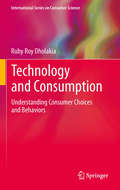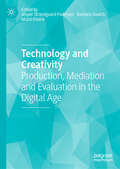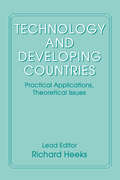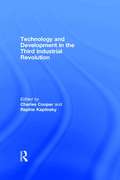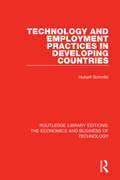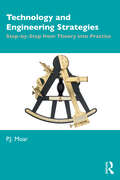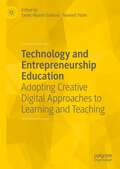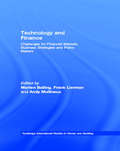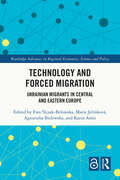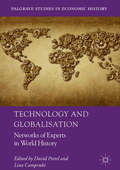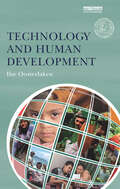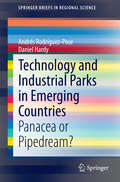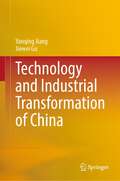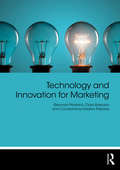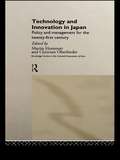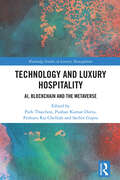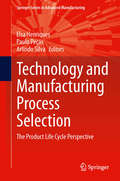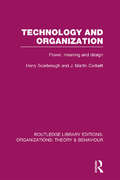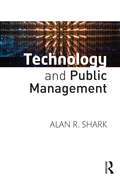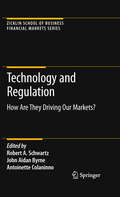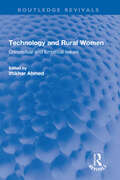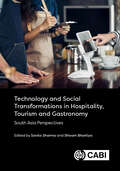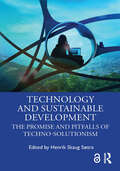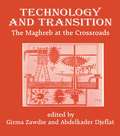- Table View
- List View
Technology and Consumption
by Ruby Roy DholakiaTechnology and Household Consumption is a comprehensive text that provides insights into technology's impact on consumer behavior and the household environment. Consumption and consumer behavior has become a very important subject of study that is now covered in many disciplines including family economics, culture studies, and feminist/women studies. In the first section, this book provides a historical perspective on how consumer behaviors have changed because of technology and how technology itself has changed. Data on ownership and expenditures is detailed in describing the penetration of technology in the household and changes over time. In the examination of demographics and social changes, an emphasis is placed on women and children. As it is important to understand the entry paths and factors that influence them, the book also introduces a research framework to understanding the adoption and utilization of household technologies. In the second section, the book examines specific household technologies and consumption experiences including shopping choices and behaviors, entertainment outlets and availability, communications technologies, and working at home. The book concludes with a section on the relationships between marketers and consumers.
Technology and Creativity: Production, Mediation and Evaluation in the Digital Age
by Jesper Strandgaard Pedersen Mukti Khaire Barbara SlavichThis edited book explores the digital challenge for cultural-creative organizations and industries, and its impact on production, meaning-making, consumption and valuation of cultural-creative products and experiences. Discussing digital changes such as user-generated content, social media, business model innovation and product development, the chapters challenge deep-seated definitions of creative individuals, organizations and industries, offering insights into how this creative aspect is argued and legitimized. Placing an emphasis on research that deals with the digital challenge, this collection theorizes its significance for the nature and dynamics of creative industries as well as its impact on the mediation of experiences and the creation and consumption of cultural-creative products.
Technology and Developing Countries: Practical Applications, Theoretical Issues
by Chris Lewis Richard Heeks Mozammel Huq Prabhakara Bhatt Ahmed ShibliThe relationship between technology and development is explored by economists, policy analysts and other experts. The adoption of technology is studied in five main areas agriculture, energy, infrastructure, the introduction of technology and the success and constraints of technological diffusion as a whole. This volume also examines the technology transfer between North and South from a perspective of training, environmental impact and aid dependency. The emphasis is not placed simply on finding problems, but ways forward are examined. By bringing together both practical and intellectual analysis, this collection signposts future directions in the technologydevelopment relationship.
Technology and Development in the Third Industrial Revolution
by Raphael Kaplinsky Charles CooperFirst published in 1989, Technology and Development in the Third Industrial Revolution is a significant contribution to history.
Technology and Employment Practices in Developing Countries (Routledge Library Editions: The Economics and Business of Technology #47)
by Hubert SchmitzOriginally published in 1985, this book analyses the extent and way in which technological change determines the utilisation of labour in less developed economies. The book compares firms which are technologically very advanced with firms which use less sophisticated machinery and equipment, and analyses how technology shapes their demand for labour. It is concerned with the impact of technological change on the utilisation of labour in terms of number of jobs, recruitment, training, skill requirements, labour turnover, wages and internal mobility; it also investigates the impact on the utilisation of external labour in the form of subcontracting of small producers and employment of outworkers.
Technology and Engineering Strategies: Step-by-Step from Theory into Practice
by P.J. MoarThis pioneering book is the first-ever practical guide to developing and communicating technology and engineering strategies.It presents a unique step-by-step method for creating robust, evidence-based strategy, known as the Five Dimensions Process (or 5DP). The book also introduces a host of original insights, including a new theory of technology, a novel approach to product innovation, and groundbreaking contributions to our understanding of technological risk. It describes many easy-to-use tools, both new and established, for supporting activities such as solution design, system monitoring, risk identification, project management, the development of personnel, and ethical decision making. The book brims with strategic and tactical advice on such topics as university collaboration, technical compatibility, data utilisation, product design, project cancellations, outsourcing, knowledge management, and risk mitigation.It is essential reading for technologists and engineers across all disciplines, technology and engineering leaders, and professional strategy consultants.
Technology and Entrepreneurship Education: Adopting Creative Digital Approaches to Learning and Teaching
by Denis Hyams-Ssekasi Naveed YasinThis contemporary book offers valuable insights on digital technology and entrepreneurship education, highlighting the importance of adopting creative digital approaches to learning and teaching. It raises the questions as to whether the current approaches utilised to convey entrepreneurial knowledge are adequate enough when preparing graduates for prospective careers. The book directly addresses the need for effective practices in teaching and reinforces the rising interest and resilience in entrepreneurship. Comprising a number of distinct chapters that illuminate digitally assisted teaching methods that are used in practice to champion student engagement when learning enterprise and entrepreneurship. The contemporary practices allude to the notion that the adoption of simulations and game-based learning increases student’ comprehension, helps in retention of knowledge, and is an excellent way to introduce new content. With the substantial challenges caused by the global pandemic this book is a vital resource at a time when blended learning is the new norm and mode of instruction in Higher Education. It is ideal for researchers, instructors and students with a keen interest in game-based approaches, as it encourages application and outlook towards entrepreneurship education.
Technology and Finance
by Anna Ilyina Roberto SamaniegoA report from the International Monetary Fund.
Technology and Finance: Challenges for Financial Markets, Business Strategies and Policy Makers (Routledge International Studies In Money And Banking Ser. #Vol. 17)
by Andy Mullineux Morten Balling Frank LiermanTechnology and Finance analyses the dramatic implications of technology for today's financial sector, for productivity growth and for monetary policy. A wide range of financial market activities are now technology driven; technology is also crucial in retail, private and corporate banking, and it has lowered entry barriers to the sector. New partic
Technology and Forced Migration: Ukrainian Migrants in Central and Eastern Europe (Routledge Advances in Regional Economics, Science and Policy)
by Ewa Ślęzak-Belowska Marie Jelínková Agnieszka Bielewska Karin AmitThe Russian aggression on Ukraine has drastically altered the migration situation in Central and Eastern Europe (CEE), drawing international attention. Despite numerous global studies on individuals seeking refuge, CEE remains underresearched. This book details the recent, lesser-known experiences of countless forced migrants who arrived there.Given the pivotal role of information and telecommunication technologies (ICTs) for both migrants and host societies, the book explores the intersection of ICTs and forced migration. With this in mind, the book focuses on Poland, Czechia, Slovakia, and Hungary, and uses comprehensive research and robust qualitative methods to demonstrate how these countries are emerging as New Immigration Destinations and handling the influx of Ukrainians. Contributions from economists, sociologists, and political scientists provide a thorough examination of how Ukrainian forced migrants navigate their lives using modern technologies, as well as their impact on these technologies.Essential reading for academics, policymakers, and professionals in the fields of migration studies, digital governance, and European affairs, this book uniquely highlights the vital role of ICTs in migration decisions, journeys, settlement, and integration. It provides a balanced mix of theoretical analysis and practical insights, helping readers comprehend the interplay between ICTs and migration. Readers will obtain a better understanding of the challenges and opportunities that digital technologies bring in facilitating and regulating forced migration in this part of Europe.
Technology and Globalisation: Networks of Experts in World History (Palgrave Studies in Economic History)
by Lino Camprubí David PretelThis book examines the role of experts and expertise in the dynamics of globalisation since the mid-nineteenth century. It shows how engineers, scientists and other experts have acted as globalising agents, providing many of the materials and institutional means for world economic and technical integration. Focusing on the study of international connections, Technology and Globalisation illustrates how expert practices have shaped the political economies of interacting countries, entire regions and the world economy. This title brings together a range of approaches and topics across different regions, transcending nationally-bounded historical narratives. Each chapter deals with a particular topic that places expert networks at the centre of the history of globalisation. The contributors concentrate on central themes including intellectual property rights, technology transfer, tropical science, energy production, large technological projects, technical standards and colonial infrastructures. Many also consider methodological, theoretical and conceptual issues.
Technology and Human Development (The Routledge Human Development and Capability Debates)
by Ilse OosterlakenThis book introduces the capability approach – in which wellbeing, agency and justice are the core values – as a powerful normative lens to examine technology and its role in development. This approach attaches central moral importance to individual human capabilities, understood as effective opportunities people have to lead the kind of lives they have reason to value. The book examines the strengths, limitations and versatility of the capability approach when applied to technology, and shows the need to supplement it with other approaches in order to deal with the challenges that technology raises. The first chapter places the capability approach within the context of broader debates about technology and human development – discussing amongst others the appropriate technology movement. The middle part then draws on philosophy and ethics of technology in order to deepen our understanding of the relation between technical artefacts and human capabilities, arguing that we must simultaneously ‘zoom in’ on the details of technological design and ‘zoom out’ to see the broader socio-technical embedding of a technology. The book examines whether technology is merely a neutral instrument that expands what people can do and be in life, or whether technology transfers may also impose certain views of what it means to lead a good life. The final chapter examines the capability approach in relation to contemporary debates about ‘ICT for Development’ (ICT4D), as the technology domain where the approach has been most extensively applied so far. This book is an invaluable read for students in Development Studies and STS, as well as policy makers, practitioners and engineers looking for an accessible overview of technology and development from the perspective of the capability approach.
Technology and Industrial Parks in Emerging Countries
by Daniel Hardy Andrés Rodríguez-PoseIndustrial and technology parks are commonly regarded as a policy panacea. They tend to be considered as the ideal instrument to alleviate an assortment of institutional, political, economic, social and ultimately, technological weaknesses and often form the centrepiece of development strategies. Yet, the real impact of industrial and technology parks, especially in emerging countries is still poorly understood. Focusing on examples from Latin America, Asia, Africa and the Middle East, the book represents a first approach to understand the potential and reality of industrial and technology parks in emerging countries. It is argued that although some parks have been successful in addressing a range of key problems, including underdevelopment, unemployment and a lack of investment, the majority have failed to deliver, rendering the promise of many parks little more than a pipedream.
Technology and Industrial Transformation of China
by Yanqing Jiang Jiewei GuThis book explores how China’s industrial transformation and development depend on technology and innovation and how considerations about issues associated with technology and innovation may affect China’s development strategies. Market-oriented reforms initiated four decades ago have constantly fueled a high speed of development in China. The country’s industrial structure has experienced rapid evolution. In the meantime, especially in the general context of globalization, the country has also opened to foreign trade and foreign direct investment, transforming itself from a virtually completely closed economy into a major trading nation and the largest developing country destination for foreign direct investment in the world. Technology is thought to be one of the key driving forces that shape the transformation of the Chinese economy. Owing to different speeds of innovation and technology diffusion, uneven development is one major issue in the process of China’s industrial transformation under new trends of globalization. Substantial disparities across different Chinese regions, e.g., the gaps in regional industrial development and those in incomes and living standards, have been one prominent feature of China and are (needless to say) closely related to different speeds of innovation and technology diffusion. The relationship between technology diffusion, innovation, and industrial development is an important yet complicated issue that deserves careful study. Considerations related to technology and innovation play a crucial role in leading and shaping China’s development strategies and routes. Sustainable development of China creates strong pressures for continuous transforming, upgrading, and restructuring of the Chinese economy, and in all of these processes, innovation and technology diffusion play a fundamental role. The book presents to the interested reader facts, thoughts, models, empirical results, and discussions that shed light on those issues.
Technology and Innovation for Marketing
by Eleonora Pantano Clara Bassano Constantinos-Vasilios PriporasMarketers have recently witnessed an explosion of technology-based innovation that has profoundly affected their management and strategy. This technology can be a gift – enabling them to get closer to their customers and their needs – or a poisoned chalice, should they fail to keep up with technology innovation and find themselves, or their products, irrelevant. In this book, Eleonora Pantano, Clara Bassano and Constantinos-Vasilios Priporas describe this phenomenon as the 'consumer pull vs technology push' that forces marketing strategists to innovate to survive and thrive. It is a guide to the emerging approaches to marketing prompted by the impact of innovation and technology, in order to help students, scholars and practitioners work innovation and change to their best advantage. Including a wealth of empirical and theoretical contributions, models, approaches methods, tools and case studies, this book is essential reading for marketing strategy, digital marketing, and innovation students, as well as marketing practitioners.
Technology and Innovation in Japan: Policy and Management for the Twenty First Century (Routledge Studies In The Growth Economies Of Asia Ser.)
by Martin Hemmert Christian OberländerThis book demonstrates that long-awaited changes to technology policy and corporate strategy are now taking place in Japan. The study also questions whether it is the programme of reform or the will and ability to implement these reforms which is new. Contributors explore the repositioning of the Japanese science and technology system on three leve
Technology and Luxury Hospitality: AI, Blockchain and the Metaverse (Routledge Studies in Luxury Management)
by Pethuru Raj Chelliah Park Thaichon Sachin Gupta Pushan Kumar DuttaThe integration of pioneering information and communication technologies has transformed the hospitality sector. This groundbreaking book delves into the transformative power of cutting-edge technologies in the world of high-end travel and accommodation. As the digital revolution continues to reshape our lives, this book offers an exclusive look at how the hospitality industry is adapting and evolving to cater to the sophisticated tastes of the modern, tech-savvy traveller.In this eye-opening exploration, readers will be taken on a journey through the latest innovations in artificial intelligence, blockchain, and the metaverse as they intersect with the world of luxury hospitality. From AI-driven concierge services and smart hotel rooms that cater to guests' every whim to the democratization of luxury experiences through blockchain-based loyalty programmes and the rise of virtual reality travel, this book reveals the extraordinary possibilities that lie ahead for the discerning traveller.With insights from international experts, this edited collection provides a comprehensive and engaging overview of the current and future trends shaping the industry and will be valuable to scholars and postgraduate researchers across the hospitality sector, innovation, and luxury management.
Technology and Manufacturing Process Selection
by Elsa Henriques Paulo Pecas Arlindo SilvaThis book provides specific topics intending to contribute to an improved knowledge on Technology Evaluation and Selection in a Life Cycle Perspectives. Although each chapter will present possible approaches and solutions, there are no recipes for success. Each reader will find his/her balance in applying the different topics to his/her own specific situation. Case studies presented throughout will help in deciding what fits best to each situation, but most of all any ultimate success will come out of the interplay between the available solutions and the specific problem or opportunity the reader is faced with.
Technology and Organization: Power, Meaning and Deisgn (Routledge Library Editions: Organizations)
by Harry Scarbrough J. Martin CorbettIn this important MBA text the authors adopt a highly integrated approach. Using the three conceptual lenses of power, meaning and design they explore fully the many different ways in which technology and organizations interact. They highlight the major debates within these competing perspectives and argue that the flow of knowledge and ideas within and between organizations is crucial in shaping technologies and organizations alike.
Technology and Public Management
by Alan R. SharkAt last, here is a textbook that covers the field of technology and public management in an informative and engaging style. Ever since the National Association of Schools of Public Affairs and Administration required greater infusion of technology into the curriculum, faculty and administrators have struggled with finding the right course materials designed specifically for the public administration environment. Technology is no longer the sole domain of an information technology office, as it has evolved into a growing set of complex tools that influence every area of government. To be effective, every public manager needs to be actively engaged in technology decisions. This textbook is designed for students of public administration at every level who need to know and understand how technology can be applied in today’s public management workplace. The book explores the latest trends in public management, policy, and technology and focuses on best practices on governance issues. Finally, this book provides real-life examples about the need for policies and procedures to safeguard our technology infrastructure while providing greater openness, participation, and transparency. Technology and Public Management covers: How information system design relates to democratic theory How and where public policy and technology intersect Skills and tools that are useful in information management, information technology, and systems dedicated for the effective flow of information within organizations Understanding the role of e-government, m-government, and social media in today's society and in public organizations Possibilities and challenges associated with technology applications within public organizations How technology can be managed, through various governance models The latest technology trends and their potential impact on public administration.
Technology and Regulation
by Robert A. Schwartz Antoinette Colaninno John Aidan ByrneTwo primary drivers have transformed the equity markets in recent years: technological advances and regulatory initiatives. How does modern, electronic technology facilitate trading, and to what extent does it present new challenges? How does regulation adjust to the changing structure of the markets, and to what extent is it itself a source of change? What are the new problems and solutions for handling institutional orders? On both sides of the Atlantic, what are the overall impacts of technology and regulation on market quality? The conference resulting in this volume brought together buyside and sellside practitioners, regulators, and academicians to address these and related issues.
Technology and Rural Women: Conceptual and Empirical Issues (Routledge Revivals)
by Iftikhar AhmedFirst published in 1985, Technology and Rural Women synthesizes the fragmented empirical evidence and the wide range of theoretical approaches on the effects of modernisation on women in the developing world. Using a multi-disciplinary methodology, empirical and sectoral overviews, and country case studies, it draws together the literature to clarify the issues and the policies. The book begins with a conceptual overview and analyses the applicability of traditional theories of technological change and impact on gender based distributional questions. It proceeds to compare the African and Asian experience, examines the African situation regionally, and then as a set of four country case studies. The authors find that the imperfections of rural factor markets have contributed to women’s concentration in labour intensive sectors, marked by low productivity and low returns. Biases in the agrarian structure and the extension services are largely responsible for the Institutionalisation of discrimination against women. Finally, the volume identifies the social, economic, and technical constraints to the diffusion of technologies relevant to rural women’s tasks. In the final chapter the book’s analysis is further refined and extended, so that its conclusions to both theory and policy making are clearly brought out, and areas of future research identified. This book is an essential read for students and scholars of labour economics, women’s studies and economics in general.
Technology and Social Transformations in Hospitality, Tourism and Gastronomy: South Asia Perspectives
by Amit Kumar Sanjeev Kumar Amandeep Khurana Omar Abdullah Kamlesh Attri Vaibhav Bhatt Sonali Chhetri R K Dhodi Rashmi Dhodi Afsheen Hassan Fatemeh Shah Hosseini Suneel Kumar Varinder Kumar Rekha Maitra Zahra Nadalipour Teena Pareek Bindu Roy Dilraj Singh Shadev Sidharth Srivastava Tahir Sufi Kuldeep VermaThis book explores the relationship between technology and social transformation in tourism, hospitality and gastronomy. It presents research and case studies, elaborating on benchmark practices adopted by tourism and hospitality professionals. In recent years, technology has transformed the tourism and hospitality industry; the chapters in this book cover areas such as guest experience and service quality, as well as operational areas such as housekeeping and waste management. Further social transformation in tourism is a result of drivers such as a growing interest in gastronomy and the use of social media; this is covered in the first part of the book. The second part outlines how communities may learn from these events. With contributions from academics, entrepreneurs, destination managers and government officials from the South Asia region, this book offers a real insight in to these areas of growing interest and provide a useful resource for those researching and studying within the areas of tourism development and hospitality.
Technology and Sustainable Development: The Promise and Pitfalls of Techno-Solutionism
by Henrik Skaug SætraTechnological change is at the core of all major disruptions in human history, and revolutions, wars, and general development are regularly connected to some sort of technological change. However, not all development is beneficial. While technology has fueled great innovations and rapid development, the notion of sustainable development has gained prominence as we now experience serious social, economic, and environmental challenges. This book examines whether technology can be used to fix the very problems caused by technology, as the various chapters examine different aspects related to how technology has brought us where we are today (which some will say is the best place humanity’s been at according to a range of metrics), and whether technology helps or hinders us in our efforts to solve the challenges we currently face. The issues discussed cover the three sustainability dimensions and include topics such as the materiality of AI, technology in education, AI for gender equality, innovation and the digital divide, and how technology relates to power, the political system, and capitalism. The chapters all build on the theoretical backdrop of technological change, sustainable development, and the UN’s Sustainable Development Goals are actively used throughout this book, both to examine how these goals capture or overlook central elements of sustainable development, and also to facilitate and create a common framework of engagement between the chapters. This book provides a novel combination of traditional theories that are explored through different case studies, providing the ground for a better understanding of how and when technology can –and cannot –be the enabler of sustainable development. It is thus an important resource for students of all disciplines, technologists, and those developing and applying new technologies. It is also a valuable resource for politicians and regulators attempting to harness the power of technology for good, while limiting its negative potential. The Open Access version of this book, available at www.taylorfrancis.com, has been made available under a Creative Commons [Attribution-Non Commercial-No Derivatives (CC-BY-NC-ND)] 4.0 license. Funded by Ostfold University College.
Technology and Transition: The Maghreb at the Crossroads
by Abdelkader Djeflat Girma ZawdieThe Maghreb countries had a promising start in economic growth after independence. For the most part they thrived on industrialisation by import substitution; but unfortunately this strategy left them with macroeconomic and structural imbalances which together have effectively constrained their ability to compete in the world economic system and to catch up with the rapidly changing global techno-economic circumstances. Issues relating to aspects of technology transfer to the Maghreb, strategies for technological and resource development and the integration of education and R&D systems with the productive systems of the economies in the region are discussed along with relevant cases from Mexico, China, South Korea, India and Bangladesh.
